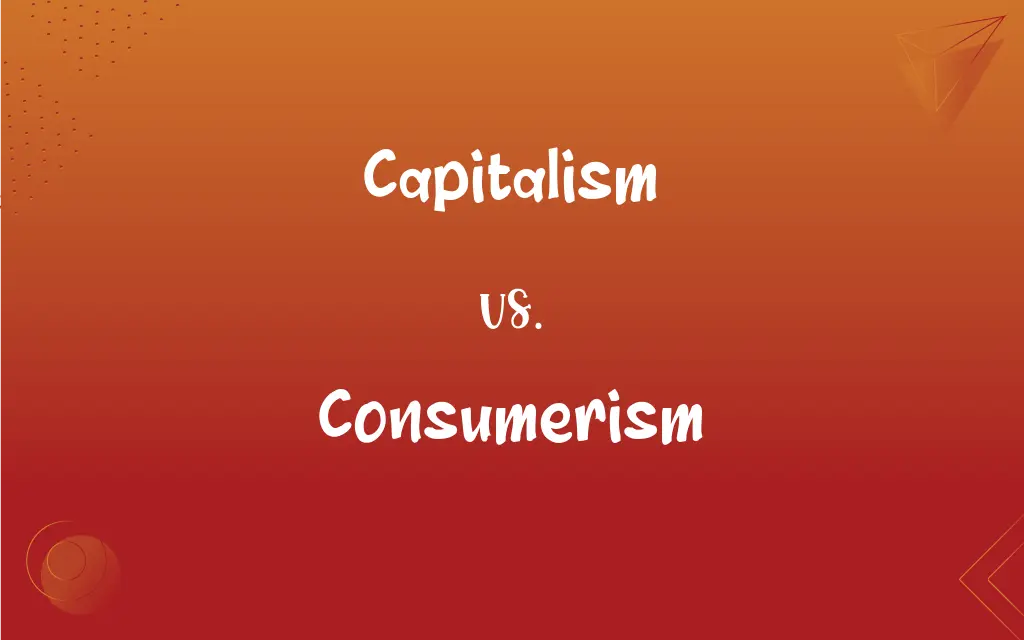Capitalism vs. Consumerism: What's the Difference?
Edited by Janet White || By Harlon Moss || Published on January 15, 2024
Capitalism is an economic system based on private ownership and profit motive, whereas consumerism is a social and economic order that encourages the acquisition of goods and services in ever-increasing amounts.

Key Differences
Capitalism is an economic model where businesses and property are privately owned and operated for profit. Consumerism, on the other hand, is a cultural attitude that places emphasis on the buying and using of goods and services.
In capitalism, the market dynamics of supply and demand determine prices and resource allocation. Consumerism drives these market dynamics, as it influences the demand side of the equation, encouraging more consumption.
Capitalism thrives on competition, innovation, and the pursuit of wealth, often leading to economic growth. Consumerism contributes to this growth by encouraging spending, but can also lead to overconsumption and waste.
Capitalism allows for economic freedom and consumer choice, enabling a diverse range of products and services. Consumerism, however, can shape these choices, often swaying them towards unnecessary or luxurious items.
Capitalism focuses on the production and distribution of goods, while consumerism is more about the consumption patterns and behaviors of individuals and societies.
ADVERTISEMENT
Comparison Chart
Definition
Economic system with private ownership
Social order promoting acquisition
Primary Focus
Production and profit
Consumption and acquisition
Role in Society
Drives economic growth
Influences lifestyle and spending habits
Impact on Market
Promotes competition and innovation
Drives demand and consumption
Relation to Environment
Can exploit resources
Often leads to overconsumption and waste
ADVERTISEMENT
Capitalism and Consumerism Definitions
Capitalism
Capitalism is an economic system where trade and industry are controlled by private owners.
In capitalism, companies compete to offer the best products at the lowest prices.
Consumerism
It's a social and economic order that encourages purchasing and owning a lot of goods.
Consumerism has transformed shopping into a leisure activity rather than a necessity.
Capitalism
It's a system where the production and pricing of goods are determined by the market.
The free market of capitalism allows for innovative startups to disrupt traditional industries.
Consumerism
Consumerism is a cultural phenomenon that prioritizes and glorifies constant consumption.
The culture of consumerism is evident in the constant demand for the latest technology gadgets.
Capitalism
Capitalism relies on competitive markets to regulate goods, services, and labor.
In a capitalist economy, market competition results in more choices and better prices for consumers.
Consumerism
Consumerism is the promotion of consumer interests and the acquisition of goods.
The rise of consumerism has led to an increase in advertising and marketing strategies.
Capitalism
Capitalism is characterized by private property, capital accumulation, and profit-making.
The capitalist drive for profit motivates businesses to improve efficiency and technology.
Consumerism
Consumerism is the theory that increasing consumption of goods is beneficial.
Consumerism often drives the economy but can also lead to unsustainable environmental practices.
Capitalism
It's an economic model that emphasizes minimal government intervention in the economy.
Capitalism flourishes when entrepreneurs are free to operate without excessive regulation.
Consumerism
It refers to the preoccupation with and an inclination toward buying consumer goods.
Black Friday sales are a perfect example of consumerism in action.
Capitalism
An economic system in which the means of production and distribution are privately or corporately owned and development occurs through the accumulation and reinvestment of profits gained in a free market.
Consumerism
The movement seeking to protect and inform consumers by requiring such practices as honest packaging and advertising, product guarantees, and improved safety standards.
Capitalism
(politics) A socio-economic system based on private ownership of resources or capital.
Consumerism
The theory that a progressively greater consumption of goods is economically beneficial.
Capitalism
(economics) An economic system based on private ownership of the means of production and their operation for profit.
Consumerism
Attachment to materialistic values or possessions
Deplored the rampant consumerism of contemporary society.
Capitalism
A socio-economic system based on private property rights, including the private ownership of resources or capital, with economic decisions made largely through the operation of a market unregulated by the state.
Consumerism
A policy of protecting and informing consumers through honesty in advertising and packaging, improved safety standards etc
Capitalism
An economic system based on the abstraction of resources into the form of privately owned capital, with economic decisions made largely through the operation of a market unregulated by the state.
Consumerism
A materialistic attachment to possessions.
Capitalism
An economic system based on predominantly private (individual or corporate) investment in and ownership of the means of production, distribution, and exchange of goods and wealth; contrasted with socialism or especially communism, in which the state has the predominant role in the economy.
Consumerism
An economic theory that increased consumption is beneficial to a nation's economy in the long run.
Capitalism
An economic system based on private ownership of capital
Consumerism
The theory that an increasing consumption of goods is economically beneficial
Consumerism
A movement advocating greater protection of the interests of consumers
FAQs
How does competition work in capitalism?
Businesses compete to provide better services and products, driving innovation.
Does consumerism impact culture?
Yes, it often shapes values, trends, and societal norms.
How does capitalism impact global trade?
It encourages international trade and investment, fostering global connections.
Does consumerism benefit all parts of society?
It often benefits those with disposable income, sometimes neglecting lower-income groups.
Can capitalism lead to income inequality?
Yes, it can result in wealth disparities if not regulated.
Is consumerism sustainable in the long term?
Excessive consumerism can lead to environmental and resource challenges.
Can capitalism exist without consumerism?
While they are distinct, consumerism often fuels the capitalist economy.
How does advertising relate to consumerism?
Advertising promotes consumerism by encouraging the purchase of goods and services.
Can consumerism affect mental health?
Excessive consumerism can lead to stress and dissatisfaction.
What is capitalism?
An economic system based on private ownership and profit motive.
How does consumerism affect the economy?
It boosts demand for goods and services, influencing economic growth.
Is consumerism linked to personal happiness?
It's debated, as material possessions don't necessarily equate to happiness.
What are the environmental impacts of capitalism?
It can lead to resource depletion and environmental degradation if unchecked.
How do monopolies relate to capitalism?
Monopolies can form in unregulated capitalist markets, limiting competition.
How does consumerism affect manufacturing?
It increases demand for manufacturing, but can also lead to overproduction.
What role do governments play in capitalism?
They regulate and sometimes intervene to ensure fair practices and stability.
What is the relationship between consumerism and technology?
Technology advances consumerism by creating new products and marketing channels.
Can capitalism lead to innovation?
Yes, the competitive nature of capitalism often drives innovation.
What is the role of ethics in capitalism?
Ethical practices are vital for sustainable and fair business operations.
Can consumerism change social values?
Yes, it can shift societal priorities towards material wealth and consumption.
About Author
Written by
Harlon MossHarlon is a seasoned quality moderator and accomplished content writer for Difference Wiki. An alumnus of the prestigious University of California, he earned his degree in Computer Science. Leveraging his academic background, Harlon brings a meticulous and informed perspective to his work, ensuring content accuracy and excellence.
Edited by
Janet WhiteJanet White has been an esteemed writer and blogger for Difference Wiki. Holding a Master's degree in Science and Medical Journalism from the prestigious Boston University, she has consistently demonstrated her expertise and passion for her field. When she's not immersed in her work, Janet relishes her time exercising, delving into a good book, and cherishing moments with friends and family.
































































